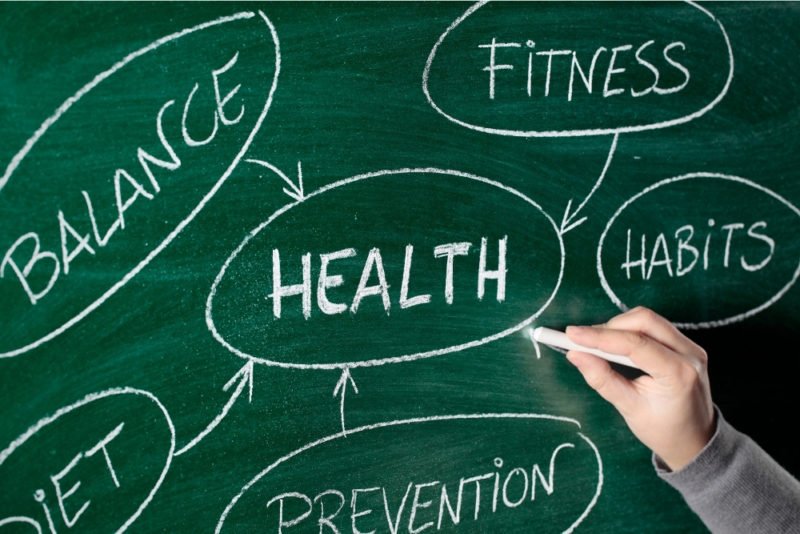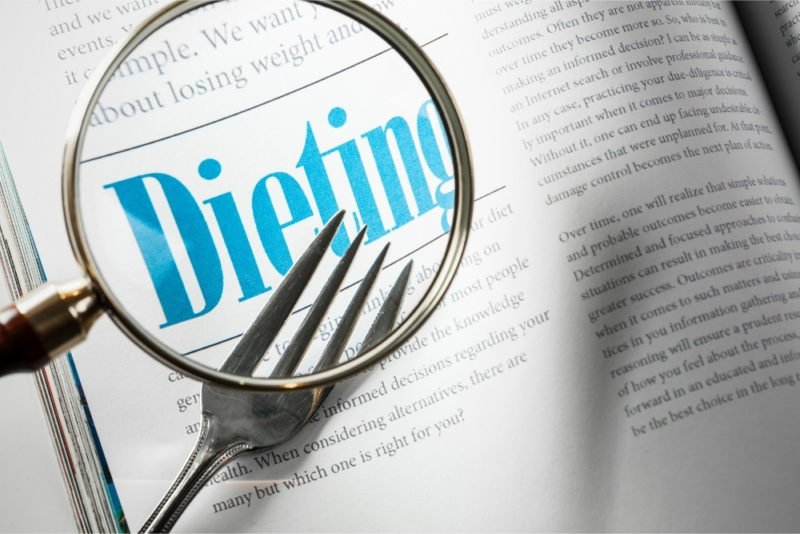
Last week, I wrote about how we’re seeing a shift from the “thin ideal” to a “healthy weight ideal,” and how these two ideals are different, but also not so different. One way that they’re not different is that both ideals often involve weight loss dieting. Before you say, “Wait, that’s not correct,” let me explain.
When you count, track and limit calories, macros (typically fat or carbs) or points with the goal of making your body smaller or dramatically altering your body composition (aka losing fat), you are engaging in weight loss dieting. This is true even if your stated primary reason is “health.” It’s also true if a book, website, or commercial weight loss program that asks you to count, track and limit calories, macros or points claims that it is “not a diet” or is about “wellness.” (See my Seattle Times article on Noom.)
If it looks like a duck, walks like a duck and quacks like a duck, then it’s a duck. Quack!
So why does this matter? It matters because dieting is not a harmless escapade. Ironic, given that so many people aren’t dieting just to look better in a bathing suit – they’re dieting because they want to be healthier. Or, they’re already healthy, but because they are in a larger body they are constantly told – by doctors, friends, family, strangers, the media – that while they may be healthy NOW, their weight is going to catch up with them if they don’t DO something about it.

Absence of help, presence of harm
There is abundant research demonstrating that:
- Diets don’t work (meaning that the overwhelming majority of people who lose weight intentionally gain most or all of it – sometimes regaining more than they lost – within five years).
- Dieting causes actual harm (ranging from increasing body dissatisfaction to contributing to disordered eating and in some cases triggering eating disorders).
It’s also notable that there is a total absence of any research demonstrating that people in fat bodies who lose weight enjoy the same lower level of health risks as people who are naturally (genetically) thin. (I use “fat” as a descriptive term, like short or tall, not as a derogatory term.)
I’m saying that with a BIG grain of salt, because while being in a thinner body is “associated” with lower risk of many chronic diseases, and being in a larger body is “associated” with higher risk of many chronic diseases, this doesn’t prove that being thinner or fatter causes lower or higher risk.
There are many flaws with “weight and health” research, including a widespread failure to factor in the positive effects of physical activity and the negative effects of weight stigma. Suffice to say that there is no evidence confirming our common belief that making a fat person thin makes them healthier.

Is weight loss related to health?
One of the best research articles I’ve seen for tying together the various threads about the harms of dieting is the 2013 review article “Long-term effects of dieting: Is weight loss related to health?” One of the co-authors is A. Janet Tomiyama, PhD, of UCLA, who studies the harmful effects of stress, dieting and fat shaming. I am a huge fan of her research. Another co-author is Traci Mann, PhD, of the University of Minnesota. Dr. Mann is also author of the book, “Secrets from the Eating Lab,” which I recommend with reservations, because while there is great information about why diets don’t work, some of the book still seems to have a lingering diet culture influence, which could be triggering for some people.
Anyway, the authors looked at whether weight loss improves health by reviewing health outcomes from long-term randomized controlled diet studies. Specifically, the looked at whether weight loss diets lead to improved cholesterol, triglycerides, blood pressure, and fasting blood sugar. They also looked at whether the amount of weight lost made a difference.
They found that, overall, there were minimal improvements in these health outcomes – but these improvements were just as likely to happen among dieting participants as they were among control group participants. So weight loss didn’t matter.
The authors did find a few larger positive effects – lower blood pressure, reduced diabetes medication use and fewer new cases of diabetes or strokes. However, they also identified factors that potentially confound the relationship between weight loss and health outcomes, such as increased exercise, healthier eating, and engagement with the health care system. For example, if you lose weight but are also exercising more, eating better and/or finally getting regular preventive healthcare, and your health improves, weight loss often gets the credit – but perhaps that’s not an accurate conclusion.

From dieting to non-dieting
Way back in 1995, the Institute of Medicine set the standard for a “successful diet” as a diet in which the individual maintains weight loss for a year…from when the diet begins. That definition remains widely accepted today. Does this sound like success to you? Let’s say you begin a diet in January, as many people do, but by the following January you’re starting to regain the weight you lost. Does that feel like success…or failure?
Of course, the failure isn’t you, the failure is diets. And the one-year “success” standard is great for commercial diet plans, because they rely on repeat customers. And of course they tell you (usually indirectly, but sometimes directly), that it’s YOU that failed, that their diet does work, but you just have to try harder to do it right.
Interestingly, in the randomized controlled trials in the Tomiyama and Mann review article, the average weight loss for people in the treatment group (i.e., the dieting group) only lost 3.5 pounds more than the people in the control group (i.e., the non-dieting group). And at the end of two years from when the diets started, the dieters on average only kept off 2 pounds. So little weight loss, and few health improvements (if any).
The authors concluded “If diets do not lead to long-term weight loss or long-term health benefits, it is difficult to justify encouraging individuals to endure them.” They also point out that weight loss appears to be unnecessary for health improvements, even pointing to studies using interventions based on the Health at Every Size (HAES) paradigm – emphasizing healthy behaviors, size acceptance and non-dieting – that have shown health benefits independent of weight loss.

The lingering shockwaves of dieting
So if there is little benefit to intentionally pursuing weight loss, what are the harms? I already mentioned increased body dissatisfaction, disordered eating and (in genetically susceptible individuals) eating disorders. Not all diets lead to eating disorders, but most eating disorders start with diets. Here are a few themes that I see come up consistently in my own clients:
Lack of body trust. I think weight loss dieting is preceded by some loss of trust in our own bodies, because otherwise why would we be trying to control or change them, but this loss of trust deepens with continued dieting, especially if we continually “fail” to keep the weight off. This leads to disconnection from our own bodies, including the refusal or inability to trust natural hunger and fullness cues.
Food obsession. A single diet requires some degree of food obsession about what to eat and what not to eat, but this becomes even more embedded with subsequent diets. The obsession can become so normalized that we can no longer think about food in a natural, uncomplicated way. Every situation that involves food – vacations, holidays, dinner with friends – becomes fraught with anxiety.
Internalized food rules. This is somewhat related to food obsession. I have many clients who have intellectually given up dieting and are even starting to make progress with Intuitive Eating, but they just can’t turn off the list of “good” and “bad” foods that’s constantly scrolling in the back of their minds. Or, they become annoyed that they can’t look at a food without a calorie, macro or point count popping up in their heads.
Internalized weight stigma. Years and years of believing that your body is wrong and you need to change it takes a toll. Even when my clients come to enjoy a freer, more nourishing and less complicated relationship with food, bad body feelings still persist, sometimes fading into the background, then springing forward when they least expect it. This is why stepping off the diet rollercoaster needs to be paired with some body acceptance work.
Disclaimer: All information provided here is of a general nature and is furnished only for educational purposes. This information is not to be taken as medical or other health advice pertaining to an individual’s specific health or medical condition. You agree that the use of this information is at your own risk.
Hi, I’m Carrie Dennett, MPH, RDN, a weight-inclusive registered dietitian, nutrition therapist and body image counselor. I offer compassionate, individualized care for adults of all ages, shapes, sizes and genders who want to break free from eating disorders, disordered eating or chronic dieting. If you need to learn how to manage IBS symptoms with food, or improve your nutrition and lifestyle habits to help manage a current health concern or simply support your overall health and well-being, I help people with that, too.
Need 1-on-1 help for your nutrition, eating, or body image concerns? Schedule a free 20-minute Discovery Call to talk about how I can help you and explore if we’re a good fit! I’m in-network with Regence BCBS, FirstChoice Health and Providence Health Plan, and can bill Blue Cross and/or Blue Shield insurances in many states. If I don’t take your insurance, I can help you seek reimbursement on your own. To learn more, explore my insurance and services areas page.
 Print This Post
Print This Post






